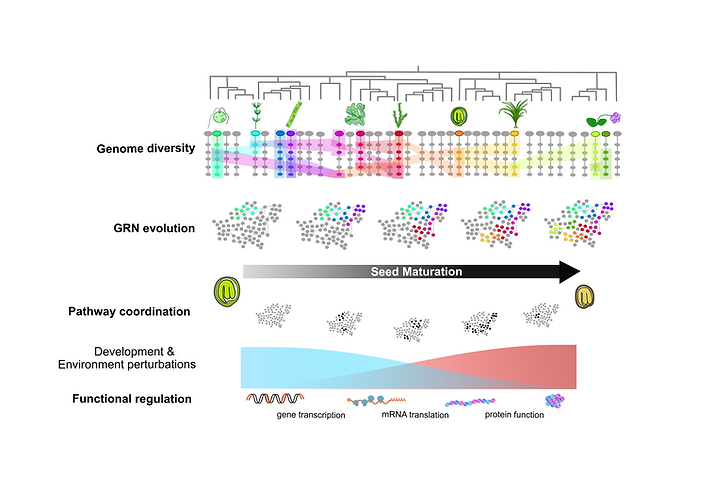Our research
Evolutionary and molecular bases of survival under drying
Currently, we use ("orthodox") seeds as a powerful biological model to uncover the mechanisms behind desiccation tolerance, one of nature’s most remarkable survival strategies. We focus on the seed maturation phase of development, when desiccation tolerance is acquired.
Our specific goals are:
-
To identify and investigate how gene regulatory networks underlying desiccation tolerance (and their associated proteins) have evolved and respond to environmental changes.
-
To study the transcriptional and post-transcriptional regulation of key desiccation tolerance genes.
-
To reveal how mechanical cues and inter-organellar communication coordinate the drying response.
With the knowledge gained from our research we are contributing with practical applications, with a special focus on improvement of crop seed storage, seed quality and resilience to drought.

Our projects
1. 'Fine drying: Seed preparation for the dry state'

Desiccation tolerance is acquired during the maturation phase of seed development, before actual seed drying. In our research we investigate what are the possible regulatory roles of drying on gene expression, mRNA translation and stability and protein structure and function in developing seeds.
Project info: This research is funded by the Netherlands Science Foundation (NWO-ENW Veni grant, 2020), Fine drying: Seed preparation for the dry state - Wageningen University & Research
Members: Dr. Mariana Silva Artur (project leader and supervisor), Asif Ahmed Sami (PhD candidate).
2. 'Seed maturation as a system to understand resilience to high temperature'
During seed maturation other important seed quality traits, such as dormancy, longevity and vigor are acquired. These traits are essential for seed survival and resilience to challenging environments.
In our collaborative project 'HEAT: High temperature Effect on Arabidopsis and Tomato seed quality', we investigate how high temperature during seed maturation affects seed survival and overall seed quality.
We combine experimental physiology and several omics approaches to identify the genetic and molecular regulation of high temperature in different seed developmental stages in a model and crop species.
Project info: This project if funded by the Netherlands Science Foundation (Open Technology Programme (Dec, 2022).
Members: Prof. dr. Leónie Bentsink (project leader and supervisor), dr. Mariana A. S. Artur (project supervisor), Lars Bakermans (PhD candidate), Inès Marais (PhD candidate) & Jan Kodde (technician).

3. 'Mechanosensing pathways during seed drying'
Producing dry seeds allow plants to survive harsh environments and ensure species persistence. During maturation, seeds gain desiccation tolerance and longevity, but these traits are progressively lost as germination begins. Although desiccation tolerance can be briefly re-induced early in germination, how these survival abilities are acquired, lost, or re-activated is still largely unknown.
We propose that mechanical forces from cellular water loss trigger signaling pathways that prepare seeds for the dry state. In this project, we integrate seed-drying biophysics with transcriptome and phosphoproteome analyses to study mechanosignaling involved in desiccation tolerance. This project is funder by the GreenTE consortium.
Project info: GreenTE - Mechanosensing pathways during seed drying - Wageningen University & Research
Members: Dr. Mariana Silva Artur (project leader and supervisor), Dr. Maria João Nogueira Ferreira (Postdoctoral researcher).
4. 'GreenSeed signaling'
Seed maturation is crucial for producing high-quality seeds, as embryos must dry, lose pigments, and acquire desiccation tolerance to survive unfavorable conditions. Despite the importance of plastids in these processes, little is known about how drying affects their function during seed maturation.
In this project, we are studying plastid structural, metabolomic, and transcriptomic changes during seed maturation, assessing their role in desiccation tolerance, and examining plastid–nucleus communication in determining seed quality.
This work will provide fundamental insights into plastid roles in stress signaling, seed maturation, and seed quality which are valuable knowledge both for plant biology and agriculture.
Project info: Green Seeds: Plastid Transitions During Seed Maturation - Wageningen University & Research
Members: Dr. Mariana Silva Artur & Dr. Charlotte Gommers (project leaders and supervisors), Sabine Kirchner (PhD candidate).
